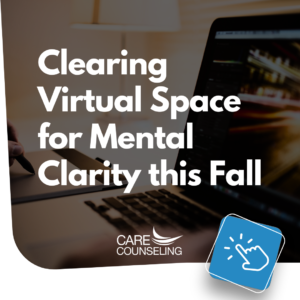Clearing Virtual Space for Mental Clarity
 As the leaves start to change and the air turns crisper, fall brings with it a sense of renewal—a perfect time to declutter not only your physical spaces but also your virtual ones. Just as you sweep away the old leaves to make way for new growth, embarking on a journey of digital decluttering can create space for mental clarity and a fresh start. In a world where our online lives are becoming increasingly intertwined with our daily activities, taking intentional steps to clear out digital clutter can have a profound impact on your overall well-being.
As the leaves start to change and the air turns crisper, fall brings with it a sense of renewal—a perfect time to declutter not only your physical spaces but also your virtual ones. Just as you sweep away the old leaves to make way for new growth, embarking on a journey of digital decluttering can create space for mental clarity and a fresh start. In a world where our online lives are becoming increasingly intertwined with our daily activities, taking intentional steps to clear out digital clutter can have a profound impact on your overall well-being.
The Impact of Digital Clutter on Mental Health
Digital clutter encompasses the accumulation of unnecessary files, emails, apps, and notifications that clutter our devices and online spaces. Over time, this clutter can contribute to feelings of overwhelm, stress, and reduced productivity. The constant barrage of notifications, unread emails, and unused apps can lead to mental fatigue and hinder your ability to focus on what truly matters.
Benefits of Digital Decluttering
Clearing out digital clutter can offer a range of benefits for your mental health and overall well-being:
- Enhanced Focus: With fewer distractions and notifications vying for your attention, you can reclaim your ability to focus on important tasks and engage in deep, meaningful work.
- Reduced Stress: A cluttered digital environment can contribute to a sense of mental chaos. Decluttering can help alleviate stress by creating a sense of order and organization.
- Increased Productivity: Digital decluttering allows you to streamline your digital tools and resources, enabling you to be more productive and efficient in your online activities.
- Improved Mental Clarity: A clear digital space translates to clearer thinking. You’ll be able to navigate your devices and platforms with ease, leading to a more organized and focused mind.
- Enhanced Creativity: Removing digital distractions can free up mental space for creative thinking and problem-solving, leading to innovative ideas and solutions.
Steps to Achieve Digital Decluttering
- Assess Your Digital Spaces: Start by assessing the clutter in your various digital spaces. This includes your email inbox, computer desktop, smartphone apps, and social media accounts.
- Unsubscribe and Unfollow: Unsubscribe from email lists and newsletters that no longer serve you. Unfollow social media accounts that don’t bring value to your life. Keep only what resonates with your interests and goals.
- Organize Your Files: Organize your files and documents into well-labeled folders. Delete files you no longer need and create a filing system that makes it easy to locate what you need when you need it.
- Clear Your Email Inbox: Create folders to categorize emails and move them out of your main inbox. Delete old and irrelevant emails and respond or archive messages that require action.
- Tidy Up Your Apps: Evaluate the apps on your devices. Delete apps you no longer use and organize the rest into folders to reduce clutter on your home screen.
- Limit Notifications: Turn off notifications for apps that aren’t essential. Limiting notifications can help you regain control over your attention and reduce distractions.
- Review Digital Subscriptions: Assess the digital subscriptions you’re currently paying for. Cancel any that you no longer use or find valuable.
- Backup and Delete: Backup important files and photos to a secure cloud storage service, then delete them from your device to free up space.
- Implement Digital Minimalism: Embrace the concept of digital minimalism, which involves intentionally curating your online activities and platforms to align with your values and goals.
Cultivating Healthy Digital Habits
Once you’ve completed your digital decluttering, it’s essential to cultivate healthy digital habits to prevent future clutter:
– Regular Maintenance: Set aside time periodically to review and declutter your digital spaces. This prevents clutter from accumulating again.
– Mindful Consumption: Be selective about the content you engage with online. Follow accounts and platforms that inspire, educate, and uplift you.
– Digital Detox: Consider incorporating regular digital detoxes into your routine. Spend time away from screens to recharge and reconnect with the offline world.
– Practice Unplugging: Designate specific times during the day when you intentionally disconnect from digital devices. Use this time to engage in activities that nourish your mind, body, and soul.
Fall into Digital Clarity
As you embrace the transformative energy of fall, channel that energy into your digital spaces. Just as you might clear out physical clutter in preparation for the new season, take the time to declutter your digital life as well. By intentionally creating a streamlined and organized online environment, you’re making room for mental clarity, enhanced productivity, and a greater sense of well-being. As the digital leaves fall away, you’ll find yourself stepping into a world of renewed focus and a refreshed perspective—one that aligns with the crisp clarity of the autumn air.



























